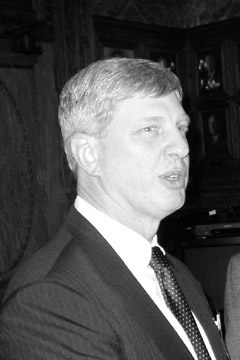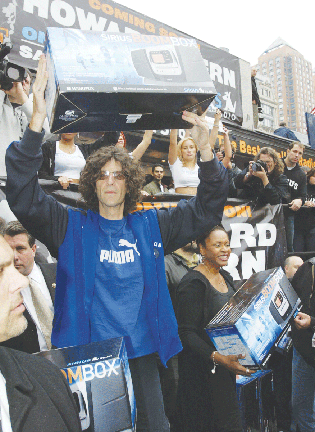UMass President Wilson Explains It All

UMass President Wilson called UMass the “indispensable university.”
September 2, 2004
UMass President Jack Wilson has a deep, dark secret, unrevealed until now: “I have to confess now, that I do moonlight as a shortstop for the Pittsburgh Pirates,” he says with a laugh.
It’s not often that Jack Wilson, the UMass president, and Jack Wilson, the Pittsburgh Pirates shortstop, get confused for one another. Dr. Keith Motley, at a press conference where he was appointed interim chancellor, joked that when he got the phone call from Wilson he thought it was the athletic one.
“I do get a kick out of that,” Wilson said, sitting back in his spacious high-rise office at One Beacon Street, with its panoramic view of Boston. “I think that could be fun, if the shortstop for the Pirates and I exchanged jobs for the day.”
Wilson ascended to the UMass presidency last March, after serving as interim for six months. In August 2003, President William Bulger had stepped down after a raucous several months fighting Governor Mitt Romney over Romney’s higher education reorganization plan.
The installment of Wilson by the UMass Board of Trustees left lingering questions. Some trustees grumbled they didn’t have enough information to vote and the local media ripped Wilson as a Bulger protégé.
Wilson first met Bulger when a search committee, in looking for a CEO of UMass Online, found Wilson, then a professor of management at UMass Amherst.
“I was very impressed by him,” Wilson said of Bulger, the controversial Massachusetts politician, who was once president of the state senate.
“But calling me a ‘protégé,’ I was dumbfounded by that, because I never knew him before I came here. But one never knows why people say these things.”
Wilson didn’t follow Massachusetts’s politics and didn’t know Bulger before he came to the Bay State. “I lived in New York, I lived in Maryland, I grew up in Pennsylvania, so I knew more about the local politics there,” he said. “I spent most of my career in higher education and as an entrepreneur. I’ve got zero political experience in terms of elective office.”
Wilson, who went from head of UMass Online to vice president of academic affairs, still occasionally sees Bulger at UMass events. “We don’t chat about business very often, because he’s moved on and doing other things, and I’m up to my eyebrows doing this,” he said.
Wilson and Bulger come from two very different backgrounds, both of which highlight the different models of a modern university president. Bulger is from a world of politics, just like Bob Kerrey of New York’s New School, and Joseph Westphal of UMaine. Wilson, on the other hand, hails from academia.
As Westphal noted in a July interview with the Portland Press Herald, modern presidents must be strong in fundraising and pitching their university.
Wilson agrees on both fronts.
“[I]s fundraising important? Absolutely it is,” he said. “But why? Because the fundraising is to provide scholarships for students; to provide financial aid for students; to provide support for the endowment; increase the research; and those are all academic issues. And I have a deep understanding and passion for those issues, coming from an academic background.”
With public relations, Wilson notes, “One of my jobs as president is to tell the UMass story.”
“It’s important for the students to have that story told, because it makes their degree even better, when people know what UMass alumni have accomplished, when they know what our research is doing,” he said, pointing to the Urban Scholars program at UMass Boston as an example. Urban Scholars, according to its website, is a “year-round, after-school, academic enrichment program, and intensive seven-week summer program serving approximately 75 high school and 30 middle school students.”
Calling it a “fantastic program,” Wilson said, “People need to understand that UMass Boston is involved with students in the city and surrounding areas, and the mission is to provide opportunities for these students that they wouldn’t have if UMass Boston didn’t exist. That’s the urban mission. That’s the story that I need to tell.”
‘Let Them Define the Urban Mission’
When asked what his view of the urban mission is, Wilson said, “I would say that my view of the urban mission is not nearly as important as what the community’s view of the urban mission is. And so I actually don’t worry so much about that kind of discussion, what is the urban mission.”
In June, when Wilson was soliciting input on who to choose for interim chancellor, he met with the Urban Mission Committee, headed by Dr. Motley. Many across campus hold different views of what the urban mission is, and how it relates to the direction that Chancellor Jo Ann Gora set before leaving for Ball State University.
“[E]ven within that committee there were different voices about what the urban mission might be,” said Wilson. “That’s what a university’s all about. Let those voices contend, let them define the urban mission. Nobody has the right and title to what the urban mission is. They all do, collectively.”
Adding that he is supportive of the urban mission “writ-large,” Wilson said, “If they start to listen to one another in that dialogue, then they’ll all be better-informed about what the urban mission is, and we’ll have a much better picture of what that urban mission is. So yeah, I have my opinions, but my opinions are not as important as what the community opinions are.”
UMass As ‘Indispensable’
Wilson is focusing on his vision for the UMass system, which he calls “the indispensable university.”
“Each campus is to serve Massachusetts in its own way,” he said, listing the following objectives: “Providing the top research that creates new companies, that strengthens existing companies, educating students for both the economic development and the social development, providing opportunities for students who otherwise wouldn’t have those opportunities, serving community needs in terms of policy, in terms of Boston Harbor clean-up.”
Wilson said that each campus should focus on Massachusetts’ needs, but each in their own ways. “We don’t want all five campuses to look alike, because then we won’t meet all the needs of the Commonwealth.”
Meeting the needs of the Bay State remains important, especially if the university wants continuing support from the State Legislature, which recently increased UMass’ funding, if only momentarily. The increases come after years of budget cuts. Across the country public higher education is becoming a state-assisted, instead of a state-supported institution.
“Funding certainly went up. What I ask from here is that we have some stability and growth to whatever extent the economy and the legislature’s ability to fund us allows. That’s, I think, the best we can expect,” Wilson said. “We have great growth. From $326 to $400 [million] in ten months, it’s good. Would we like to see that again? Oh, sure. Do we expect to see that again? Unfortunately not.”
The university system’s total budget is $1.7 billion and the State Legislature gave $400 million. In turn, the university has to get funding from other areas. “[S]o that means research, philanthropy, all of these things will be important to us,” said Wilson. “We’re going to have to work on all of them.”






















































